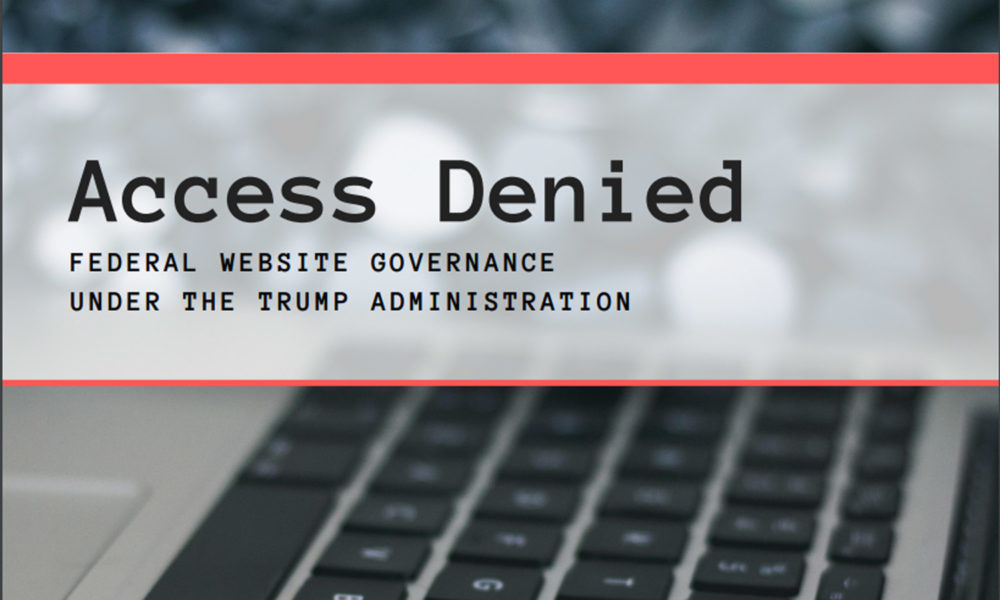Over the last four years, the Environmental Data and Governance Initiative (EDGI) has documented and analyzed changes to federal environmental websites. What our team found was alarming: unprecedented steps by the Trump administration to manipulate information about environmental issues and laws, marked particularly by patterns of removing public information prior to environmental proceedings and censoring climate change-related information on websites.
Websites are how federal agencies communicate with the public, and changes to them can impact public participation in environmental regulatory processes. The information that’s available—or unavailable—on federal websites matters for the health of democracy and the environment. Yet there is currently little policy guidance for the governance of information found on federal agencies’ websites.
The findings in EDGI’s latest report Access Denied: Federal Web Governance Under the Trump Administration and academic paper Visualizing Changes to US Federal Environmental Agency Websites, 2016–2020 show why this needs to change.
What EDGI found
In Access Denied, we uncovered a pattern of information being deleted or made less accessible just before or during a regulatory process. This finding was dramatic—over 80% of the information removals we observed occurred just prior to or during an active regulatory proceeding. Here are some specific instances where this occurred:
- In April 2017, more than five months before proposing to repeal the Clean Power Plan, the Environmental Protection Agency redirected its entire Clean Power Plan website to a single new webpage, “Energy Independence,” with no information about the Clean Power Plan.
- In May 2017, more than two months before proposing to repeal the Clean Water Rule, the EPA removed web resources previously available about the rule and its underlying science. These resources included fact sheets, an infographic, and videos. The EPA redirected its Clean Water Rule website to a new WOTUS Rule website, comprised entirely of information about the rulemaking process and selective legal background.
- Between December 2017 and April 2018, the US Fish & Wildlife Service removed, revised, and reduced access to Migratory Bird Treaty Act web resources essential to the public participation process for revisions focused on incidental take of migratory birds. A previous Department of the Interior 30-page opinion regarding incidental take was replaced with a one-page memo.
- In May 2018, days before the opening of a public comment period for proposed amendments to Greater Sage-Grouse Resource Management Plans, the Bureau of Land Management removed web resources, including fact sheets about sage grouse and each affected state’s current conservation efforts. The web pages hosting this information were removed in the days following the end of the public comment period in August 2018, more than seven months before the amendments were finalized.
In the paper Visualizing Changes, EDGI’s review of thousands of web pages from federal agencies, including the EPA, NASA, and NOAA, found that the use of the term “climate change” decreased almost 40 percent between 2016 and 2020. We also found a pattern of using coded language such as “resilience” and “sustainability” instead of “climate”; changes that occurred more frequently and to a larger degree on pages of Cabinet-level agencies with a more direct connection to the White House; and changes that occurred more on higher-visibility web pages that the public would be more likely to encounter.
These are staggering findings, indicating a pattern under Trump of federal agencies manipulating information in ways that undermined the public’s ability to understand environmental issues and participate in rule-making.

By the end of the Trump administration, the use of the words “climate change” fell by almost 40% across websites for US federal environmental agencies. Image from Visualizing changes to US federal environmental agency websites, 2016–2020.
An opportunity to address gaps in federal website governance policies
The White House Office of Science and Technology Policy’s (OSTP) current review of scientific integrity at federal agencies provides an opportunity to address current policy gaps around web governance. Based on our findings in Access Denied and Visualizing Changes, we recommend the OSTP create legally-enforceable policies that ensure public digital information is accessible and protected.
Currently, no repercussions exist for agencies that strip factual public resources from websites. Moving forward, there must be systems of accountability when changes to websites occur, as well as requirements that agencies provide vital contextual information for regulatory decisions. We recommend the OSTP direct agencies to build publicly accessible historical records and archives of web pages as they are updated, with a notification process of when content will be removed from websites.
To learn more about EDGI’s findings and recommendations, read the Access Denied report and Visualizing Changes paper. Faith in the scientific integrity of federal agencies needs to be restored, and establishing better web governance policies is a central piece of regaining and retaining the public’s trust.

